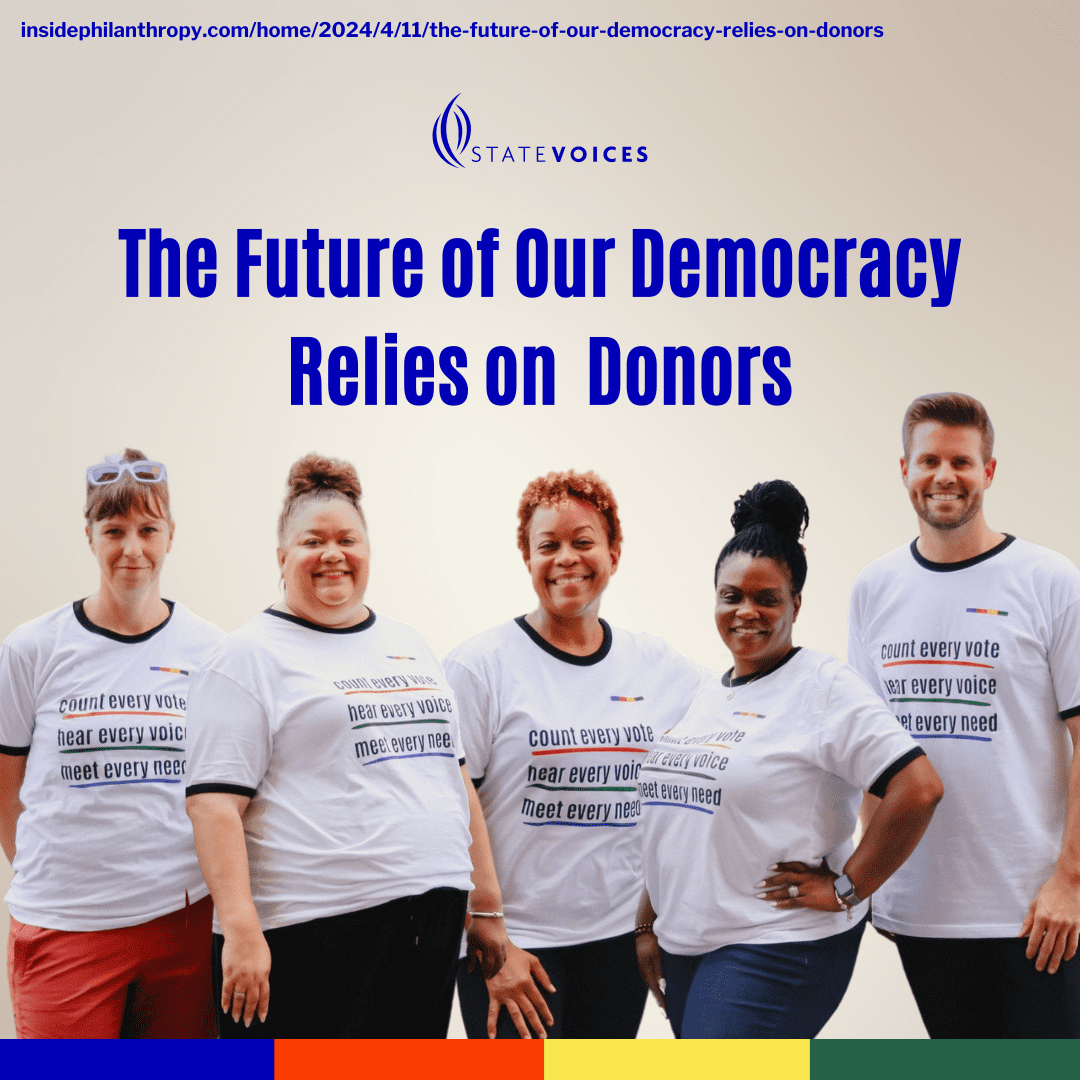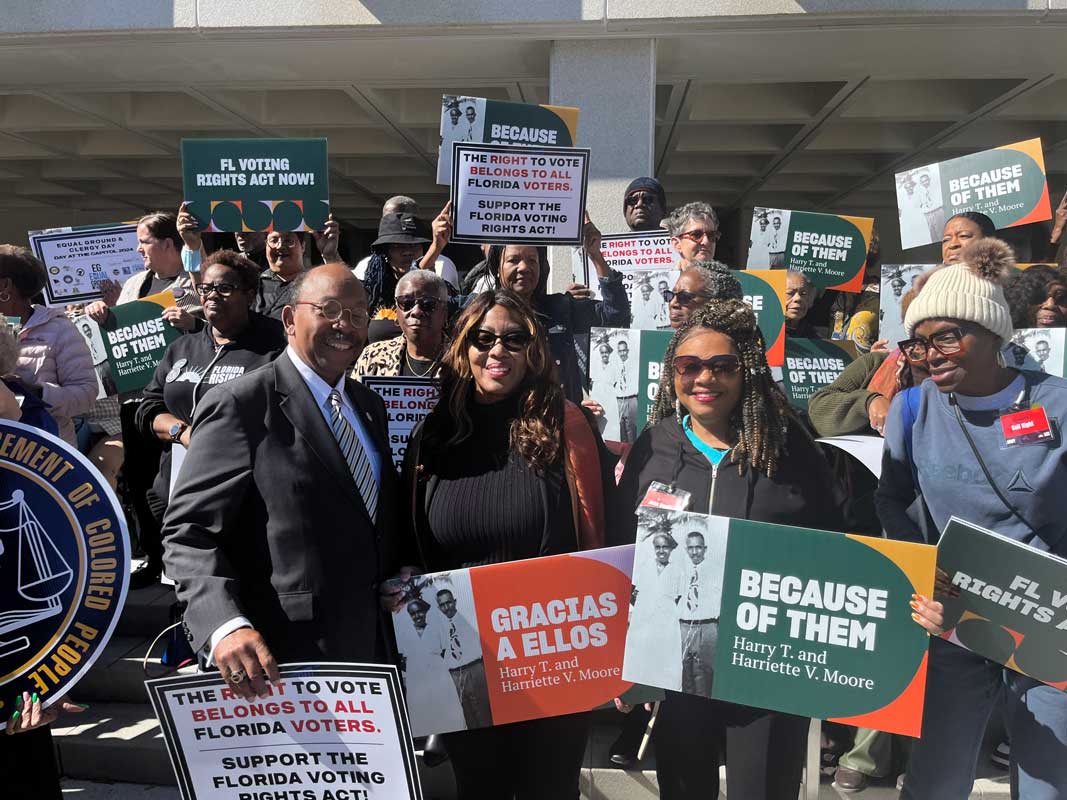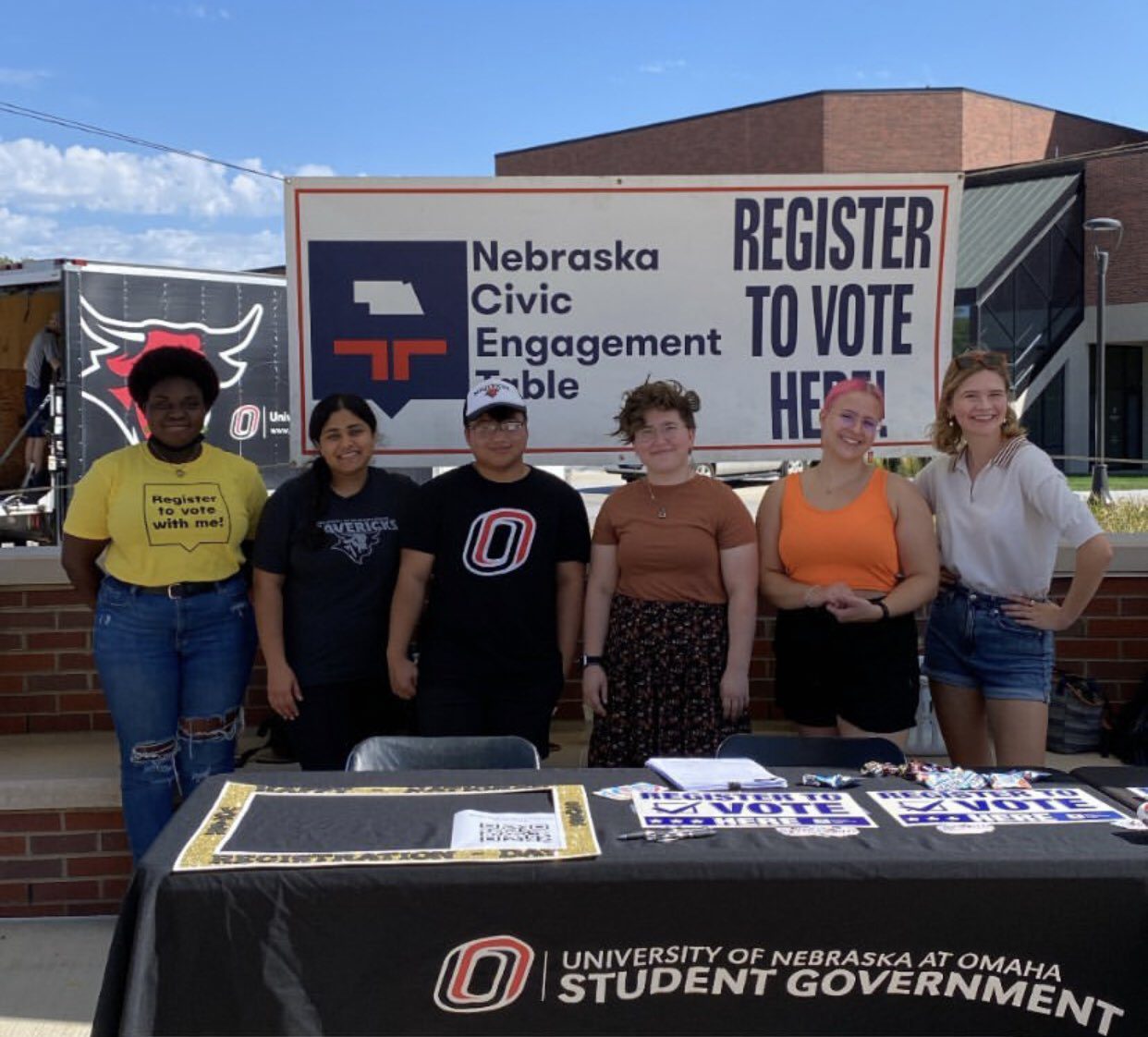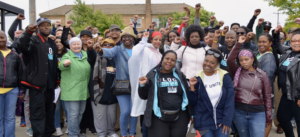NOTE: This article was first published in 2020.
The call to defund police and invest in Black futures is echoing around the world.
These calls gained volume after the police killings of Breonna Taylor, George Floyd, Tony McDade, and so many others. These murders exposed a harsh, long-standing reality of this country: police and prisons harm Black people every day. The carceral system is the primary source of violence against Black people in the U.S.
This moment of uprising has been building for a long time, and it’s exposing foundational flaws in our democracy. The U.S. police and prison system has been proven to regularly abuse, harass, sexually assault, and disappear Black people. This is especially true for those who are impacted by multiple systems of oppression, like Black women and femmes, poor Black folks, Black TLGQBIA+ people, and Black disabled people.
Civic engagement organizations must ask the following question: how can Black communities engage in the civic process equitably when so many are in cages, are disenfranchised, or are rightfully fearful of or disillusioned by the state?
A true democracy is one in which everyone is engaged, represented, listened to and supported regardless of race, gender, immigration status, sexuality, ability, religion, or class. Black communities have no chance of being able to fully engage in our democracy as long as police and prisons exist.
Until policing is abolished, our democracy is not a democracy at all.
What is Abolition?
Abolition is the removal of policing and cages in all their forms, and the creation of a world in which everyone has the resources they need to survive, thrive, and find restoration in moments of harm.
Many Black feminists and radical theorists explored abolition for a while. In her book Abolition Democracy: Beyond Empire, Prisons, and Torture, Black liberation activist Angela Davis asks, “How can we produce a sense of belonging to communities in struggle that is not evaporated by the onslaught of our everyday routines? How do we build movements capable of generating the power to compel governments and corporations to curtail their violence?”
What does it look like to have a society in which nobody is in a cage? Where everyone is guaranteed a home, food, health care, jobs, and education? What does it look like for people to be safe in their neighborhoods, advocate for themselves and their needs, and create and engage in democratic processes that support their self-determination?
Abolition also provides opportunities to engage in transformative justice in times of abuse and harm. What could it look like to invest in survivor-centered approaches where victims are provided with support and resources they need to heal? To see harm-doers take accountability for their actions while we provide them with support to become better, and to work collectively on transforming societal conditions that enable abuse and harm in the first place?
It’s time for more civic engagement organizations to listen, to recognize the extent to which policing prevents us from having a liberated world and a healthy democracy. Policing contributes directly to disenfranchisement, marginalization and disillusionment, segregation and gerrymandering, and the overall disruption of Black and Indigenous communities. All of this is well documented and by design.
Policing and Voter Disenfranchisement
One of the ways policing impacts Black communities’ ability to engage in the democratic process is through voter disenfranchisement.
The U.S. is one of the only countries that takes away voting rights from people with convictions, and the U.S. also has the largest incarceration rates in the world. Given that a disproportionate amount of incarcerated people in the U.S. are Black, disenfranchisement of people with convictions people is a voter suppression tactic. These laws were created to prevent Black people from voting.
In many states, people with convictions can’t vote at all. Maine and Vermont are the only states that allow incarcerated people with convictions to cast a ballot, and only 16 states restore voting rights for people with felony convictions as soon as they’re released. In 21 states, people can’t vote while on probation. In 11, the majority of people with felonies will never be able to vote again.
“People with felonies in Wisconsin can vote once they are off probation or parole. Unfortunately, after they’re off parole, many don’t even know their right to vote has been restored,” says Markasa Tucker, the Director of #LiberateMKE, a campaign to divest from Milwaukee police and invest in the community. “The ACLU found that one out of nine Black voters in Wisconsin are disenfranchised.”
Incarcerated people have been demanding a voice in the democratic process for a long time. Voting rights restoration was a primary demand during the Prison Strike of 2018, in which incarcerated organizers in collectives like Incarcerated Workers Organizing Committee and Jailhouse Lawyers Speak released demands for justice for incarcerated people.
More civic engagement organizations should support these efforts.
“New Orleans is one of the most incarcerated places in the world. So when we talk about re-enfranchisement, that’s a big number,” says Ashley Shelton, the Executive Director of the Power Coalition for Equity and Justice in Louisiana. A coalition of grassroots organizations fighting for civic access and BIPOC political power, the Power Coalition prioritizes supporting currently and formerly incarcerated organizers and collectives to amplify their perspectives and needs.
Voice of The Experienced (VOTE) is one of those organizations. A partner to the Power Coalition, VOTE is a network of formerly incarcerated people and their loved ones.
“Felon disenfranchisement isn’t new in this country. These things were legislatively enacted just to keep Black folks out of the loop,” says Norris Henderson, VOTE’s Founder and Executive Director. “We’ve been fighting for rights for a long time. After Hurricane Katrina, the police were balling out of control, and we won a campaign to create an independent police monitor to watch what the cops were doing.”
“Right now, some people are in awe and shock about how police behave. But here, we know that up close and personal.”
Policing Marginalizes Communities
Policing doesn’t just disenfranchise people who are arrested and incarcerated; it also marginalizes their families and communities. Police save their most violent practices and surveillance for Black neighborhoods. This directly impacts civic engagement in these areas.
Several texts, like Arresting Citizenship and Trading Democracy for Justice, explore the relationship between incarceration and levels of civic engagement. They find that communities whose primary contact with the state is through police and incarceration—whether they themselves are targeted or they have loved ones in the carceral system—become discouraged from engaging with the state. The state and all its institutions represent danger.
This dampens people’s civic participation, from voting to completing the Census.
This is especially true for Black documented and undocumented immigrants living under the threat of Immigrations and Customs Enforcement (ICE), another policing institution. The Census is supposed to count everyone living in the U.S., regardless of immigration status, and the information collected is confidential. But the fear of surveillance, detention, and deportation discourages many immigrants from counting themselves in.
Several civic engagement organizations have recognized this and invest in ending the violence of policing. This includes Black Queer & Intersectional Collective (BQIC), a partner to Ohio Voice, a coalition of grassroots organizations fighting for BIPOC political power in Ohio.
BQIC has been organizing protests, know-your-rights trainings and cop watches because Black communities across the state have been traumatized by police violence. 16 year-old Julius Tate was killed by police in Columbus in 2018, and two Black protestors were brutalized by officers earlier this year when they demanded justice and answers. Now, many protestors in the current uprisings are being brutalized and surveilled by the state.
“So many Black trans and queer people ask themselves every day, ‘how do I protect myself when the state won’t protect me?’” Prince Shakur, an organizer with BQIC, says. “And more people are realizing that if you go out to a demonstration, it doesn’t matter if you’re peaceful, if people are looting, or if you’re sitting next to a child. The police will shoot you. They will mace you. And where’s the accountability?”
“If you even had to quantify the harm that the system has done over the last two to three weeks, that number would be unfathomable. And that’s what we have to confront.”
Policing Supports Segregation and Gerrymandering
It’s not a coincidence that the communities that police target also tend to have less polling places and more restrictive voting laws and processes.
Police help enforce segregation through surveillance and profiling to control the spaces Black people can occupy. Many police forces in the U.S. started as slave patrols with the intention of capturing escaped enslaved folks. This evolved to targeting Black people in certain areas to enforce segregation. Segregation makes it easy for the state to target predominantly Black districts with policies and laws limiting their access to vote or otherwise engage in the democratic process.
This connection is especially clear with gerrymandering, or when politicians manipulate the redistricting process to draw districts in a way that provides them with an advantage and, usually, weakens the voices and votes of communities of color.
“We’re pushing for a fair redistricting process. We already know we’re going to sue the state of Louisiana because they’ve never submitted redistricting maps that have passed the Shelby test. Ever,” says Ashley Shelton.
One gerrymandering tactic is to identify where communities of color are and then create irregularly drawn districts packing multiple neighborhoods into a small, concentrated number of districts; this way, other districts can have more power. Another tactic is to identify those neighborhoods and split them into many different districts to diffuse their collective power.
Another form of gerrymandering that is bolstered by policing is prison gerrymandering. Incarcerated people are often sent to prisons far away from their home, and most prisons are in predominantly white areas. In the Census, incarcerated people are counted as residents of where they are imprisoned, instead of their homes. Since prisons are concentrated in white areas and Black people are disproportionately imprisoned, prison gerrymandering leads to higher Census counts in white areas and lower counts in Black areas.
This directly impacts the federal funding communities receive. It also impacts political representation, like the number of representatives an area gets, if states fail to adjust their redistricting data to ensure equitable redistricting.
“Black communities have been looted of wealth through redlining, discriminatory government policy, and racial violence. #LiberateMKE is calling for community investment into housing and public health,” says Markasa Tucker. “For the Census, with each person that is counted comes money for community investment for similar programs.”
But because of prison gerrymandering, even if we achieved a totally 100% Census count this year, Black communities in most states would still be at a disadvantage and not get the full resources and political representation they are owed.
Policing Restricts Survival
There’s no quicker way to destabilize a community than by restricting access to resources and making survival increasingly difficult. And when people don’t have the resources needed to survive, their ability to engage in democratic processes is limited.
“We refuse to give people a living wage, but are more than happy to give big businesses tax cut after tax cut,” says Ashley Shelton. “There is a system of laws and structures that trap Black people in poverty and criminalization.”
Black and Indigenous people face obstacles to necessities like housing and employment due to discriminatory policies and practices. Having a criminal record increases these obstacles, and policing targets Black and Indigenous people with arrests. Restricted from accessing traditional means of survival, some people end up engaging in underground economies to get by. Because of the criminalization of these economies—and the overall criminalization of survival—this leads to increased chances of interacting with the police and being arrested.
It’s a vicious cycle designed by the state in order to destabilize, silence, and disappear Black and Indigenous people.
“The Power Coalition does a lot of work around fines and fees. Many Black people in Louisiana get their license suspended for the inability to pay them,” says Ashley Shelton. “How can you pass a background check for a job, how can you vote, how can you get from place to place if your license is suspended because you couldn’t pay a $250 fine? Our Municipal Court calls the fine and fees system ‘the black tax’ to this day.”
“There’s a sanitation workers strike going on as we speak,” says Norris Henderson. “They’re not being paid a living wage, and during the pandemic they haven’t gotten personal protective equipment even though they take care of our garbage every day.”
Many Black people are fighting for a roof over their head, fighting to figure out what they’re going to eat at night, or trying to figure out how to get medical care for themselves and their families. When people are spending their time fighting to survive, it’s harder to access civic engagement activities like voting. And it’s important to note that some people’s families have been in poverty throughout generations, regardless of who has been in office.
It’s time for deep, meaningful change.
What Could Abolition Look Like?
“I just see the community. It is a community where people are inherently valuable,” says Markasa Tucker. “Everybody’s needs are met and there is a garden in the middle that represents our connection to the land. I don’t see police because they will no longer exist. We have community control.”
Police and prison abolition is not just about removing harmful institutions; it’s about creating new, supportive ones. This kind of society hasn’t existed on a mass scale for us yet. But it is possible.
Abolition as a practice requires creativity, study, deep relationships, community building, and a commitment to transformation. We must believe in the strength of our collective imagination to envision a world where we can all live in our full dignity.
“My biological father and my stepfather both have been in prison…I’ve experienced the harm of splitting a Black family up, having a Black child go to a prison every weekend to visit a parental figure. The psychological harm of policing and prison needs to be assessed,” says Prince Shakur. “Abolition is addressing centuries of harm.”
Defunding police, ending their contracts, and disbanding them—while investing in community—are a few concrete steps we can take to pursue abolition. Collectives working to end gender violence and state violence, like the Combahee River Collective, started calling for divestment from police and investment in resources decades ago. Advocates like Mariame Kaba, Ruth Wilson Gilmore, Andrea Ritchie, and organizations like Critical Resistance, Survived and Punished, and BYP100, explore abolition as a requirement to end violence against Black lives. The uprisings are increasing the momentum of this movement.
It’s time for civic engagement organizations to commit to abolition as a necessary precursor to a healthy democracy.
“This is the moment. Something’s got to break,” says Ashley Shelton. “We’ve tried reform and things haven’t changed. Some people say they’re scared that comments about defunding the police will alienate moderate white voters and we’ll lose elections. And I’m like, no. No! As a Black woman, I go to bed scared and I wake up scared everyday. We deserve reparations.”
“In addition to all the other things that are defined as reparations, the 40 acres and a mule, reparations also looks like abolishing the systems. Tear them down.”
The best way to learn more about abolition, and to support Black lives, is to connect with the work of collectives supporting Black lives in your local community. By relying on one another and being accountable to each other, and by integrating civic engagement with mutual support and grassroots organizing around issues pertinent to Black communities, we can create a healthy democracy together.
Organizers who have been fighting for police divestment and reinvestment in communities for years, like Norris Henderson, are hopeful that we can achieve this future.
“Several years ago, during a hot summer like this one, New Orleans wanted to reallocate four million dollars to the police department, just for the summer. Four million for just a few months! I was like, oh hell no,” Henderson says. “If you give me a million dollars, I can make it rain in the hood and all your problems will go away.”
“People are starting to listen.”



